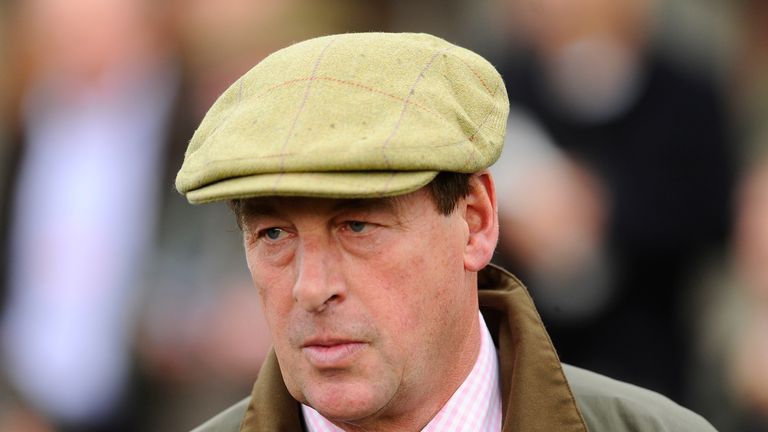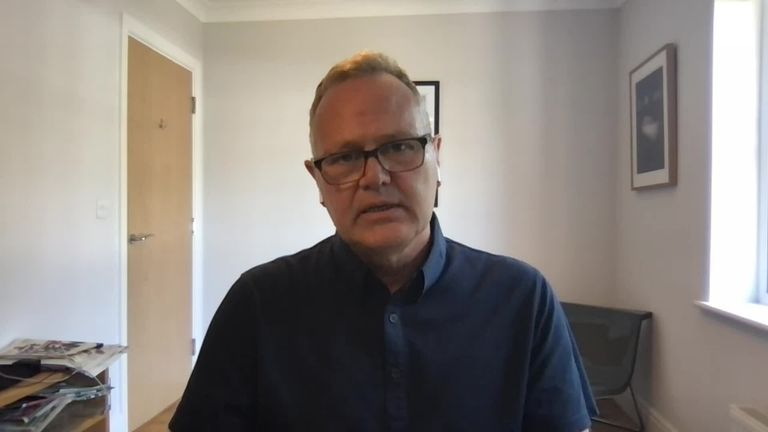Racing Panorama investigation: Irish officials deny knowledge of 'thousands' of racehorses sent to UK abattoir
BBC Panorama investigation, called The Dark Side of Horse Racing, reported to show horses, previously trained in Ireland, being taken to an abattoir in the UK, with some appearing to carry injuries during travel
Tuesday 20 July 2021 13:57, UK
Irish Government officials have denied they were aware "thousands" of ex-racehorses, previously trained in Ireland, were reportedly being sent for slaughter at British abattoirs.
A BBC Panorama programme on Monday claimed most of the 4,000 racehorses killed in British slaughter plants had been transported from Ireland, with some travelling more than 350 miles by road with critical injuries.
It is illegal under Irish and European law to transport a horse in a way that is likely to "cause it injury or undue suffering".
Covert recording also appeared to show serious breaches of regulations for slaughter plants. The Food Standards Agency, which regulates abattoirs, has said "upholding animal welfare and the safety and authenticity of the food we eat is a top priority for government" and have promised to take action against any evidence of mistreatment of animals.
A number of Irish government officials appeared before the Joint Committee on Agriculture, Food, and the Marine on Tuesday.
The agriculture department's deputy chief veterinary officer Michael Sheahan said: "For me, probably, the most striking issue was around the whole area of horse slaughter.
"The footage from the abattoir in Swindon was probably the thing that struck home most with me."
The footage captures dozens of horses apparently shot by a worker who is standing yards away.
Mr Sheahan told the committee that method of slaughter is not used in Ireland. He said he has been involved in horse slaughter for 20 years, adding the number of horses slaughtered in Ireland vary from year to year.
Ireland currently has two approved slaughter plants, with one closed following a fire at its premises.
He added: "I'm happy to say that we're very satisfied with the way things operate in the slaughter plant here.
"They're regulated in pretty much the same way as a beef slaughter plant or a sheep slaughter plant.
"We have a full-time official Department of Agriculture vet present at all times when the slaughter is taking place."
Independent senator Ronan Mullen said what emerged from the programme was "extremely disturbing".
"The picture we are getting in recent times in Ireland is that we might be a horse-loving nation, and while there might be people in horse racing who do love horses, there's seems to be a lot of people in the horse racing industry who don't love horses," he added.
"They see them as machines and entities to be used for making money. It is hard for us to believe you are very surprised at what went on in the documentary last night.
"I think most people will feel that you had a fair idea for some time that this kind of thing is going on."
Dr Kevin Smyth, assistant secretary general at the department, said he had "no idea" what was happening.
"I categorically knew nothing about this until I saw what was on last night," he added. "I had no inkling whatsoever."
Mr Mullen was also critical of the traceability system in place for horses, accusing officials of failing to pursue an animal welfare agenda "with vigour".
Mr Sheahan said there is a "need to move forward" with plans to update regulations this year, adding the traceability system in the horse sector is "nowhere near" as good as the cattle sector.
"We have a Rolls-Royce system when it comes to cattle. In horses we don't, but we have come a long way."




